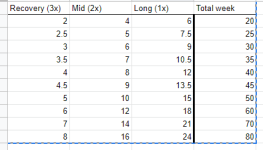For the various Ironman's and 1/2 Ironman's my wife has competed in, she always had specialized coaches and never ran more than the goal distance in any of her training runs. So for a 42km run she probably hit 34km only once during her longest training run and there's increasing evidence that even that might be too much. As you probably know, the purpose of your accumulated mileage over the weeks is so that your body will be fine for the race day, due to the gradual building / loading each week. So there should be no need for you to ever eclipse 18km when training for a 1/2 Ironman if you are running 3-4x per week already. That extra energy usage could be better spent on speed workouts or your weakest sport that you need to improve upon.
Your weekly totals are also increasing by as much as 20% in some weeks which seems high to me. 6 runs a week also seems more than needed, except for light transition workouts right after another workout (i.e ride the bike for 3 hours, and then immediately head back out for an easy 3-5k to get your muscles used to the switching). My wife has a lot of clients who are elite Ironman's, and they would never have more than 4 dedicated runs per week in training,
If you were only training for a marathon and just running you might get away with that, but also cycling and swimming will mean your body is not recovering enough between workouts. By running too often, increasing loads too quick, you will eventually get injured and then compromise your whole training plan.
FWIW - when training for the 30km Around The Bay, I never exceeded 22km on a long run, and my weekly totals never exceeded 55km. I can post up a sample training plan if it helps.
Totally hear you on it and agree (especially on the increases)... but this is allllllllllll at very slow pace and it's also not increasing every week, otherwise i'd die; so i might spend 2 weeks on the first step, and if it doesnt feel comfortable i'm staying at that step. And
technically at the 5th step, the mileage will decrease as one of the mid runs will be threshold/tempo/steady state intervals (so 400m, 1000m intervals at mid intensity). I won't be doing speed work this time around, that's usually where i break apart every, single, year, (last year when i did 80/20 endurance run training plan, same thing pre-covid with other plans) although that could've been attributed to stopping mobility/strength training a month prior to taking on speed work due to laziness. Excess weight and speed runs don't seem to like to work together and would then require more recovery time.
Probably after half ironman, when i'll re-focus on shorter distance, i'll add some speedwork. I'm trying to focus a bit more on the run because it's my weakest link out of all 3 disciplines. But i'm also keeping it low intensity to avoid injury on my "too-fat" ass. Lower intensity means i need volume to trigger adaptations and make up for the lacking high intensity part of it. Annnnnnd i enjoy the slow runs at night, just me and my breathing and my music, so it helps me hit the consistency checkbox which is quite major.
For the swim, i don't have big expectations, but as long as i'm working it 3 times per week (2 indoors and 1 open-water), i get results. And my masters team will be resuming in april so that'll keep me in line for sure, comparatively to my 40-minute workouts at the city pool last year.
The bike is similar, i've already been doing some structured training on the bike 3 x per week since the beginning of feb and it's the segment i enjoy the most.
So most of the intensity will be in the water and on the bike, as i can handle those a lot better and a few of those "recovery easy runs" will also serve as brick workouts.
Goals here:
Swim 00:50 (i can probably get to 2'00"/100m)
Bike 4:00 (basing myself off of my pace for my 130km ride last year and i wasn't rushing, although it was super crazy hilly in some parts and ridiculously hot)
Run 2:30 (looking at my times last year for my oly distance, where i didn't train my run much from may to august due to injury)
Just slightly over double my olympic distance times. If i do better than that, I'll be happy.
















